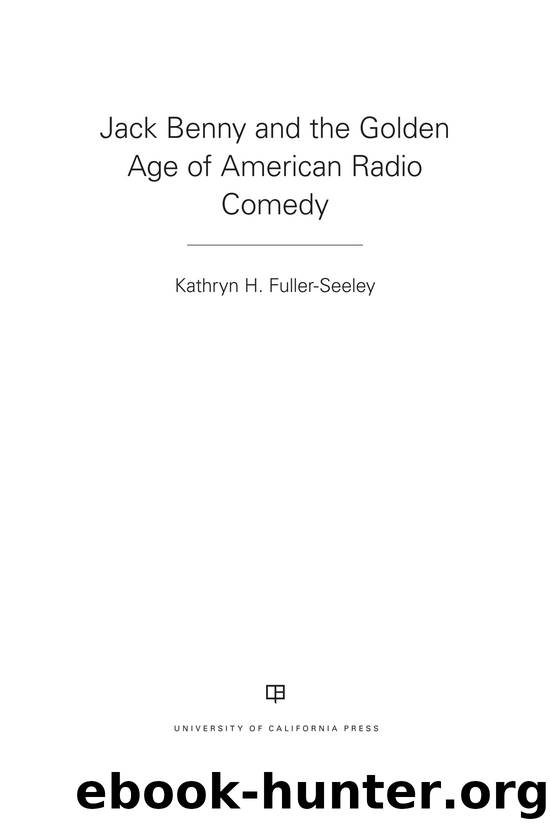Jack Benny and the Golden Age of American Radio Comedy by Fuller-Seeley Kathryn H.;

Author:Fuller-Seeley, Kathryn H.;
Language: eng
Format: epub
ISBN: 4823046
Publisher: University of California Press
SIX
The Commercial Imperative
JACK BENNY, ADVERTISING, AND RADIO SPONSORS
“Jack’s success as a salesman in moving goods, first for General Foods and then American Tobacco, was absolutely incredible,”1 recalled legendary broadcasting executive Sylvester “Pat” Weaver in 1963. Weaver knew what he was talking about, having worked with Jack Benny in radio over twenty years through an advertising agency, a sponsor, and a network.2 Benny collected accolades from industry observers, critics, and the public throughout his radio career for his ability to merge entertainment and consumer product advertising. As soon as he started in radio, Benny learned that commercial broadcasting had a wider variety of masters to please than he had experienced in vaudeville or in film. Each group he worked with in radio promoted different agendas. Harried network vice presidents attempting to keep sponsors satisfied tried to shape Benny’s program. Persnickety sponsors interested in promoting their product and pleasing their own cultural tastes tried to dictate what Benny did on air. Advertising agencies sought to bend Benny’s radio show to their own marketing interests. To navigate this minefield, Benny became what the television industry today would term a “show runner”—not only a performer, but also an involved, hands-on co-creator and manager of his own entertainment product. Getting the support and resources he desired, and creating comedy in these circumstances was not easy. After all, Benny ran through four sponsors in his first two and a half years on the air.
Consumer advocate groups and radio critics bemoaned the commercial imperatives of radio in the 1930s and 1940s, despairing at the professional, aesthetic, and ethical compromises that program creators had to make for the sake of selling things.3 As no one was more successful than Benny at working within the context of advertising, he could easily be dismissed as a “sell out.” Given the industrial factors in the contemporary entertainment world pushing advertisers back into production of media content, however, there are lessons to be learned in analyzing how Benny negotiated, over nearly twenty-five years in radio, the complex relationships and restrictions of the sponsor system.
By involving himself in the creation of commercial advertising messages, Benny could enhance his radio program in several ways. He could have more control over the content of the twenty-seven minutes of his show that fell between the bookends of opening and closing commercials. This helped Benny shape the “flow” and continuity of his program. Especially as Benny and writer Harry Conn began developing characters and story lines (as opposed to presenting a collection of one-line jokes), the comedy benefitted from lack of the jarring interruptions of ad verbiage so common on other shows. Benny turned his radio announcer from the pompous, dour person who droned dull messages into a joke-making member of the radio family. Benny scripter Milt Josefberg recalled, “Jack’s kidding of the commercials became a high plateau of humor on his programs, and the public looked for it as eagerly as the rest of the show.”4
Crafting the middle commercial themselves also allowed Benny and his writers
Download
This site does not store any files on its server. We only index and link to content provided by other sites. Please contact the content providers to delete copyright contents if any and email us, we'll remove relevant links or contents immediately.
Fanny Burney by Claire Harman(25779)
Empire of the Sikhs by Patwant Singh(22164)
Out of India by Michael Foss(16310)
Leonardo da Vinci by Walter Isaacson(11897)
Small Great Things by Jodi Picoult(6086)
The Six Wives Of Henry VIII (WOMEN IN HISTORY) by Fraser Antonia(4784)
The Wind in My Hair by Masih Alinejad(4420)
The Lonely City by Olivia Laing(4112)
The Crown by Robert Lacey(4099)
A Higher Loyalty: Truth, Lies, and Leadership by James Comey(4027)
The Iron Duke by The Iron Duke(3636)
Millionaire: The Philanderer, Gambler, and Duelist Who Invented Modern Finance by Janet Gleeson(3565)
Sticky Fingers by Joe Hagan(3449)
Alive: The Story of the Andes Survivors by Piers Paul Read(3303)
Papillon (English) by Henri Charrière(3264)
Joan of Arc by Mary Gordon(3253)
Stalin by Stephen Kotkin(3081)
Aleister Crowley: The Biography by Tobias Churton(3015)
Ants Among Elephants by Sujatha Gidla(2920)
